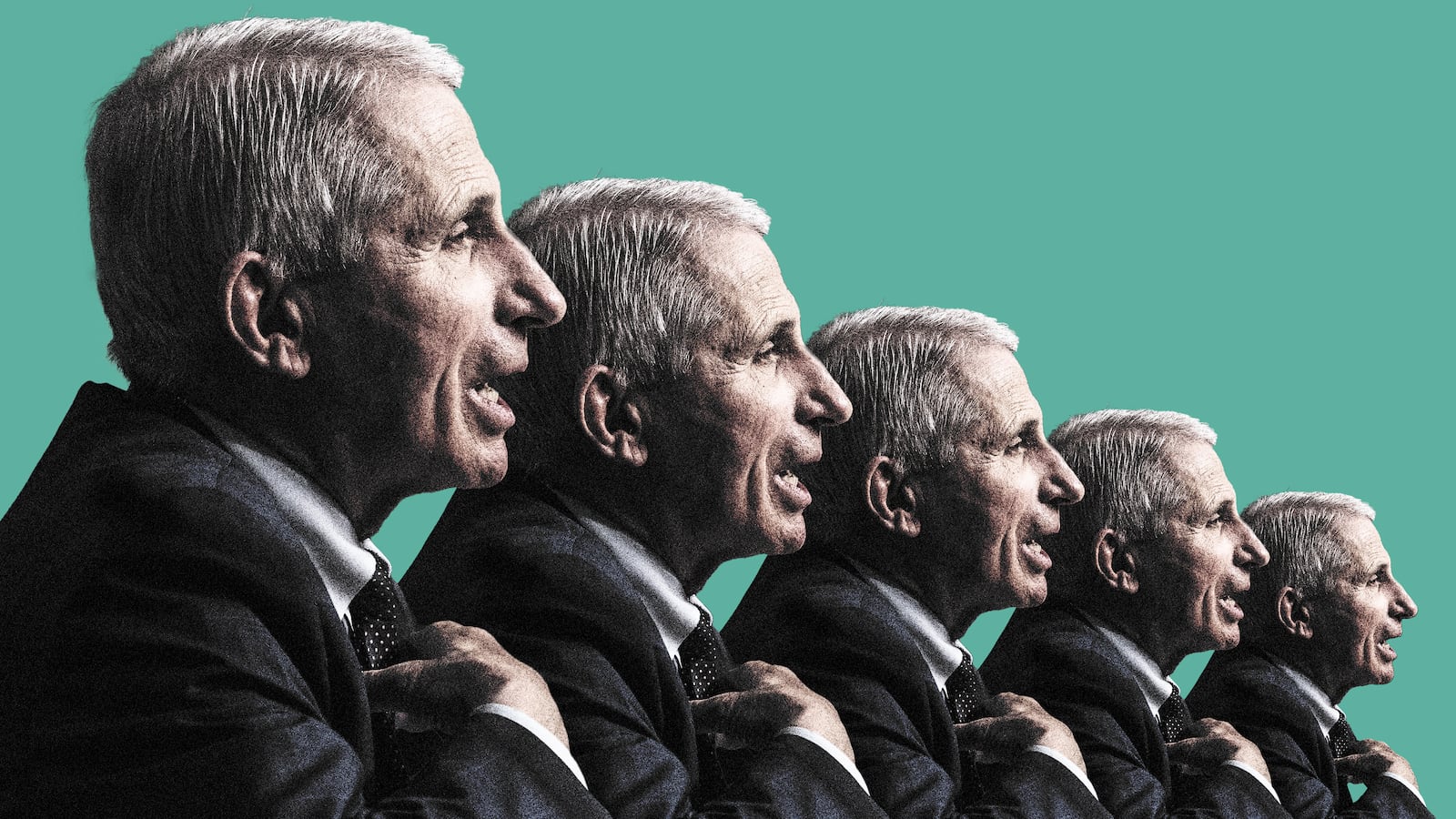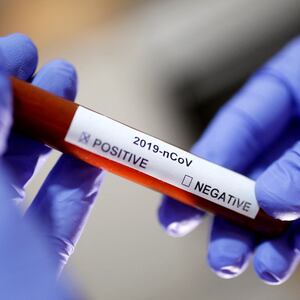In January 2021, Dr. Anthony Fauci allowed a documentary crew to follow him during his second year as the lightning rod in a violent storm—the face of the nation’s guidelines for controlling and combating the COVID-19 pandemic.
The timing was auspicious. American Masters: Dr. Tony Fauci, which premieres March 21 on PBS, begins with Fauci watching the inauguration of Joe Biden, which would mark a seismic shift in his work with the White House as the director of the National Institute of Allergy and Infectious Diseases and the chief medical adviser to the president.
At that point, nearly 24 million Americans had been infected by COVID. Stoked by the misinformation disseminated by right-wing networks, politicized fury unleashed by Republican members of Congress, and taunts by then-President Donald Trump, one vocal contingent of the country had spent the better part of a year launching threats at Fauci as he attempted to mitigate the dangers of the pandemic. “It really is, ‘Let’s prosecute Fauci! Let’s hang him! Let’s shoot him. Let’s kill him!’” Fauci tells The Daily Beast. “To the point where I have to have federal marshals with me all the time.”
Of course, both during that time and since, he’s been heralded as a hero and become something of a pop culture icon among those grateful for his life-saving efforts during a traumatic, uncertain—and ongoing—period. His face has appeared on everything from T-shirts to donuts, people have named their dogs after him, Brad Pitt played him on Saturday Night Live, and there was a petition for him to be named People’s Sexiest Man Alive.
The dissonance between being hailed as “America’s most trusted doctor” and enduring vocal threats on his life is “a little bit disarming,” he says. “The one good thing is that, by my estimate—and I think it’s a reasonably accurate estimate—I think the people who care about me and admire the things I’ve done, compared to the people that want to kill me, it’s about a 9-to-1 ratio. The only trouble is that people that want to kill me are very loud about it and very repetitive about it.”
Camera crews followed Fauci for almost two years, culminating in his decision to step down from his position at the federal government after 54 years. The film captures his on-the-ground efforts to get more Americans vaccinated as well as his reflections on the vitriol the pandemic incited—which he compares to the ire he faced in the ’80s and ’90s from LGBT activists over the government’s response to the HIV/AIDS crisis.

“I don’t think it falls under the category of retirement,” he says of this new time in his life, which began in December. “As it has turned out, commitments that I’ve made prior to stepping down have heavily spilled over into January and February. And in fact, I’m working, in some respects, as hard as I have worked before—just with a little bit of a different slant, because I’m trying to establish myself outside of the government, getting likely a position at a university so that I can write and lecture and travel and do other things that I hope will be contributory to society.”
Ahead of American Masters: Dr. Tony Fauci’s PBS premiere, we spoke with Fauci about the relief he felt when the Biden administration took over, his frustration with the echo chamber of anti-science and anti-vaccine activists who pose a risk to public health, what it was like to be confronted with the extent of the violent threats against him, and his assessment of where we are now in the battle against COVID.
After stepping down, do you feel less pressure being the face of the efforts to fight the pandemic?
Well, the far right continues to attack me every day. I think if you do a search on Google or YouTube, there is not a day that goes by that either Fox News or Breitbart or one of the far-right radical publications says something distorted, outright lying, misinformation, demonization, ad hominem. It just goes on and on. So that hasn’t let up.
In the documentary, your wife spoke about you having to come to the realization that the pandemic is not something you’d be able to tie up during your time as the NAID director —and therefore you would have to walk away while it was still going on. What was that process like coming to that realization?
It was gradual. But then a full appreciation from a purely scientific standpoint. Given the nature of this virus—everything from its transmissibility, which is highly efficient; the lack of universal acceptance of vaccines; the very short durability of protection against infection, even with prior infection and prior vaccination—we never were going to eradicate this virus. We’ve only eradicated one virus in the history and annals of virology, and that was smallpox.
So then you ask yourself the question, are we going to eliminate COVID? Which means get rid of it in the United States, but maybe have it lingering someplace else? And the answer to that, I came to the conclusion, was also no. For the simple reason: It’s highly transmissible. Protection is not very durable, and the virus changes a lot. So I came to the conclusion that it’s not going to go away in my lifetime. So there has to be a time when I say, “I’m going to step down because they have other things to do.”

How did you feel about that?
I was fully aware that although we are much, much better off now than we were a year ago… A year and a half ago, we were having 800,000 to 900,000 infections a day, and 3,000 to 4,000 deaths. Now, we’re having 300 to 400 deaths a day; occasionally, a bad day, it will go up to 500. There are two sides to that. The first is, we’re much better off than we were in the past. But the other side of the coin is, we’re not at a low enough level that I would feel is acceptable and we should feel comfortable with. Namely, it isn’t really over yet.
Were you worried that people might see something symbolic about you stepping down? That it meant that this is all over?
It’s a great question, Kevin. But you know, you can’t base life decisions on what you think the public’s reaction might be. That’s a bad rabbit hole to go down.
There are two pillars to this documentary, where you go through, in real time, people’s polarized reaction to your pandemic advice, but then also look back at how it compared to the reaction to the government’s HIV/AIDS response 40 years ago. Were reflecting on those two things different experiences for you?
They were, and I thought that that was one of the positive aspects and perhaps even the genius of the film, juxtaposing my experience with HIV 40-plus years ago and my experience with COVID now. I hope people get that nuance from the film—that if you look at the demonstrations and the pushing back against me as a public official during the AIDS years, it was a group of young, mostly gay men who really had a message that they wanted people to listen to. It was based on the truth. It was based on reality. And it was based on the fact that the scientific and regulatory establishment, the way it was operating was ill-suited to be able to handle this emerging new disease called HIV/AIDS.
They wanted to gain our attention. So they were iconoclastic, disruptive, and theatrical. They wanted us to listen to them. Probably one of the best things I ever did in my life was to put aside the theatrics, put aside the confrontative nature of what they were doing, and listen to what they were saying. Once I listened, it became clear that they were making perfect sense. If I were in their shoes, I would have been doing the same thing.
And that was different from what the criticism has been like to COVID in recent years.
Yes. In contrast to that, the pushing back I have now is ridiculous. It’s demonization ad hominem: distorted reality, outright lies, disinformation, and misinformation with no noble end goal in place. It really is, “Let’s prosecute Fauci! Let’s hang him! Let’s shoot him. Let’s kill him!” To the point where I have to have federal marshals with me all the time. That’s very different from my going to the gay and lesbian community center alone, with 100 angry and frightened gay men there, knowing I was perfectly safe doing that. I hope the audience gets that message.
I imagine it must be a strange experience to have, on the one hand, people who lionize you and do things like name their dog Fauci because they admire you. And then on the other hand, you do have the vocal contingent of people who are demonizing you and threatening you. What is it like to be sitting in between both extremes?
It’s unusual. It’s a little bit disarming, I have to tell you. The one good thing is that, by my estimate—and I think it’s a reasonably accurate estimate—I think the people who care about me and admire the things I’ve done, compared to the people that want to kill me, it’s about a 9-to-1 ratio. The only trouble is that people that want to kill me are very loud about it and very repetitive about it. They have this bullhorn that they use.
Even our own congressmen who run on the ticket “Fire Fauci, prosecute Fauci, put him in jail”—when you ask them, “Why do you want to do that?” they don’t have an answer. It’s a talking point that someone gave them. I think quite frankly, Kevin, that it’s a metaphor for the divisiveness in our society. It just doesn’t make any sense. We are living in one of the most divisive periods in the history of our country, maybe dating back to the Civil War. So this is craziness. We have people who love me and name their dogs after me and put my face on donuts, compared to people who really want to see me get guillotined. I just think that’s a metaphor for the divisiveness in our society.
This documentary project started in January 2021. Did you feel that there was a change to your mental health or to how you felt about doing your job when the Biden administration took over versus a Trump administration?
Yes. My goodness. It was starkly different. Starkly different. I stayed in with the Trump administration because they felt if I walked away, you know, then he’d have replaced me with another Scott Atlas [Trump’s onetime coronavirus adviser]. And we didn’t need another Scott Atlas in there. It was very painful because I had to speak the truth in order to preserve my own personal and scientific integrity, as well as fulfill my responsibility to the American public. But every time I did that, it was another wave of hostility towards me in the circle of the White House.

That had to be a surreal experience.
I mean, the White House did some bizarre things. The communications department did opposition research on me and sent out a white paper to all of the networks and the Post and the Times, pointing out that I was wrong most of the time. This was at a time when I was working in the White House. I mean, are you kidding me? So the atmosphere was very different, because the first telephone call and then the first meeting I had with Joe Biden when he asked me to be his chief medical adviser was, “I want you to go out there and tell the truth. Even if the truth is uncomfortable, that’s all we want you to do.” And it was sort of like a breath of fresh air. So it was an amazing difference.
Were you ever surprised in yourself for being able to weather that kind of treatment?
Well, I’m gonna say something that I feel honestly and deeply. People may say, “Oh, he’s just saying it,” but it isn’t. I just felt a deep responsibility, as a physician, for the health of the American public. I just felt I had to stick it in there and keep telling the truth until they fired me. And they didn’t fire me, which was interesting.
How did you feel watching the scenes in the documentary where Senator Rand Paul attacked you and threatened you—and all those bullying tactics?
When I saw the scene again, about that preposterous time when he actually didn’t hint, but stated that I was stepping back and refusing to accept responsibility for the death of 4 million people—even as I’m talking to you now, that pisses me off. I mean, if he weren’t a senator sitting behind that podium, I could have sued his ass so badly for libel. But he was hiding behind the cloak of his position.
The thing that put me aback a bit is that, because I don’t watch television that much, I had not seen nearly as many of the clips of the people who were there demonstrating, saying, “Fauci lied, people died,” and putting a Hitler mustache on me. The only thing I can say to myself is, how could so many people be so misguided by a distortion of reality that spread on social media? That kind of put me aback a bit more than reliving the scenes with Rand Paul and those other people.
As we enter year four of this, if you had the opportunity to talk sense into the people who oppose you and oppose science, what would you say to them?
The most important thing is: Once you veer away from reality and the facts—which is what science is, facts and data—everything else crumbles. Because the truth—and science being the instrument to get to the truth—when that falls apart, almost everything in society falls apart.
I am not a Republican. I’m not a Democrat. I have no political ideologies. And I totally respect the diversity of ideological opinions. You know, it makes for diversity in society. But when you have the incredible amount of divisiveness that we have right now, that is not sustainable. So if I have a message for people, it’s that we have got to figure out a way to not hate each other. I mean, particularly when you’re in the middle of a pandemic that has already killed a million Americans, fighting with each other and hating each other is the worst possible outcome.








